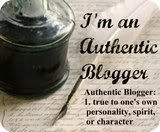People make mistakes, especially writers. They use the wrong word sometimes, or they don't realize a sentence came out meaning the exact opposite of what they meant to say.
Reporters can be the same way, of course. Maybe they got a fact wrong, or further revelations make something they claim in a story untrue?
In the era of print journalism, corrections would have to be made in later editions. They would have a corrections box that would say something like "in yesterday's story on President Obama's speech, he was identified as President of the United Kingdom. He is, of course, President of the United States. The Journal-Post-Picayune regrets the error."
They didn't report every error, and accusations of getting the story wrong (intentionally or unintentionally) could still be leveled at a newspaper, but the fact that the story was written in a certain way would be indisputable. Somebody could grab yesterday's edition and show what was actually written.
With online journalism? For some reason, journalistic institutions don't seem to feel the need to do that anymore.
Sometimes it's relatively harmless, changing a misidentified person or the spelling of a name. Other times, though, it's particularly egregious and could easily be seen as the outlet attempting to cover its tracks.
Take the Associated Press story about the hostage stand-off in Alabama, where a man shot and killed a school bus driver and took his 5-year-old son hostage.
As shown on Bob Owens' blog, one term keeps getting changed.
When talking about what the man was known for in the neighborhood, the article originally said that he had patrolled his yard with a "flashlight and shotgun." It was later changed, with no notice, to "assault rifle." Hmmmmm. Think that might have something to do with the discussions currently going on in the United States?
Owens then notices them quietly (and again, without notice) changing it back to "shotgun," and then how it was subsequently changed to "firearm." He has a screengrab of the article stating it's an "assault rifle," however.
Commenters have pointed out that it was then changed to "long gun" with a statement that the gun had not been identified.
It's actually quite confusing, with one of the links mentioning a change now going to a more recent article that doesn't even mention how he used to patrol his yard.
No matter whether it was error or bias, where's the accountability? Why don't news organizations append the correction at the bottom of the article when they update it?
Even worse, I've seen some update or re-write whole articles at the same links without any notice whatsoever. If you receive a link to a news story where a friend of yours says "Can you believe the government did this?" and you can't see what your friend is getting upset about, it's very possible that the reason is because the article was edited between your friend sending it to you and you actually reading it and the offending issue is no longer there.
I'm not saying that every misspelling correction should be mentioned. If your article mentions the "Untied States of America" and you correct that to "United," fine. You don't need to tell the reader that the article has been changed. But when you get a fact wrong, or further information is added to the story, I believe it's the responsibility of the news organization to alert their readers to the change.
Something to the effect of "the above article originally said the man patrolled his yard with an assault rifle. Since there is conflicting information about what type of gun he used to patrol his yard, this has now been changed to 'long gun.'"
Perfect! Yes, they can still be accused of bias for using the original term ("yeah, sure it was a 'mistake'!"), but they can't be accused of trying to cover their tracks.
The number of people who trust the media is falling further and further all the time. Accusations of bias fly hot and heavy (and yes, full disclosure, I agree with a lot of the accusations). Actually noting corrections and changes to your articles won't change those accusations, but it would inhibit any accusations of them trying to hide what they're doing.
It would be a start.
I'm not letting bloggers off the hook. Ed Morrissey over at Hot Air always notes when he's made a correction or a change (I think the other bloggers over there do too; I just can't remember any specific instances). I try to also (though that would require an actual readership to hold me accountable).
Whitewashing your errors (or your bias) is never a good thing. It makes you look sneaky and just adds to the horrible reputation that journalists and journalistic organizations have.
"Nothing to see here, folks. Move along, move along" is a running joke on the Internet in regards to trying to get people to ignore something.
It's funny because it's true. Too often, that's the reaction of people in power trying to cover up their mistakes or their biases. Not acknowledging your changes is an excellent way to do that.
Edit (2/5/13): The LA Times gets it right in this story on how people don't want autographs anymore (something I may blog about later this week). Assuming that they don't change the article again at some point.
Subscribe to:
Post Comments (Atom)
















I think a lot of times, people who write on the Internet don't bother to correct things because it seems like everyone's in such a rush to put stuff up that there's no time to be careful. And by the time the mistake is noticed or called out, the moment has long passed.
ReplyDelete